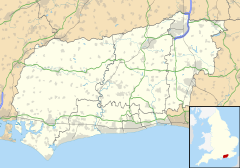Human settlement in England
| Charlton | |
|---|---|
 View of Charlton from Levin Down View of Charlton from Levin Down | |
 | |
| OS grid reference | SU888130 |
| Civil parish |
|
| District | |
| Shire county | |
| Region | |
| Country | England |
| Sovereign state | United Kingdom |
| Post town | Chichester |
| Postcode district | PO18 |
| Police | Sussex |
| Fire | West Sussex |
| Ambulance | South East Coast |
| UK Parliament | |
| |
Charlton is a small village in the Chichester district of West Sussex, England. It lies on the Singleton to East Dean road 5.3 miles (8.6 km) and the River Lavant north of Chichester. At the 2011 Census the population of the hamlet was included in the civil parish of Singleton.
Toponym
The name Charlton comes from "churl", meaning free peasant, and "ton", meaning settlement.
History

In the 1670s towards the end of Charles II's reign, the Charlton Hunt was established, which would be attended by nobles across the country until the 1750s. Fox Hall, named in reference to the hunt in question, was built in 1730 on the edge of Charlton for the 2nd Duke of Richmond, designed in the Palladian style (possibly by Roger Morris, a student of Lord Burlington).
In 1915, 17th-century pub The Fox Goes Free became the site of the first Women's Institute meeting.
References
- "Singleton and Charlton Parish Design Statement" (PDF). Singleton Parish Council. Retrieved 25 November 2024.
- Sloan, Hilly. "The Hunting Dukes". The History Guide. Retrieved 25 November 2024.
- Haslam, Charlotte. "Fox Hall History Album" (PDF). The Landmark Trust. Retrieved 25 November 2024.
- "Women's Institute buildings relisted for centenary". BBC News. 9 November 2015. Archived from the original on 30 January 2016. Retrieved 9 November 2015.
External links
This West Sussex location article is a stub. You can help Misplaced Pages by expanding it. |